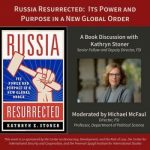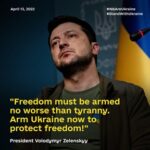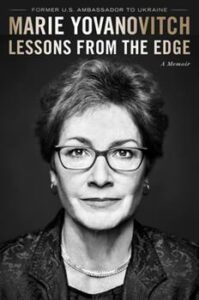New Zealand’s Prime Minister has warned the West not to cast Russia’s invasion of Ukraine as a broader battle between autocracy and democracy, saying it could undermine efforts to get China to help ramp-up pressure on Moscow, ABC reports.
Jacinda Ardern said that, while some countries who had given Russia “direct support” — such as Belarus — should also bear consequences, it would be a mistake to “characterize this as a war of the West vs Russia. Or democracy vs autocracy. It is not.”
The world is “bloody messy” but must take a step back from polarization and black-and-white approaches to conflict, she said in a speech to the Lowy Institute in Sydney, arguing against the hardening of alliances.
“Nor should we naturally assume it is a demonstration of the inevitable trajectory in other areas of geostrategic contest,” Arden added.
Others disagree.

Credit: Stanford CREEES
“That’s all this is about,” said Stanford University’s Kathryn Stoner, author of “Russia Resurrected: Its Power and Purpose in a New Global Order”. “It is not about Russian security, militarily. It is not about NATO. It is about democracy. We have it. We have to fight for it. We have to be the example for people who are putting their lives on the line to get it.”
The war in Ukraine is a test for democracy that is never going to really end, argues Toronto University professor Lucan Way. Because even in the most optimistic scenario where Ukraine regains its territory and it goes back to the 1991 borders, Russia is almost certainly going to present a permanent threat to Ukrainian sovereignty, he tells the Democracy Paradox podcast.
I think objectively it will. But even if objectively it wasn’t, after such an invasion, you can imagine the political environment’s going to treat it as one, adds Way, a contributor to the NED’s Journal of Democracy.
 An important part of President Volodymyr Zelenskyy’s strength is the mutual bond between him and the Ukrainian people, writes Ambassador William B. Taylor, vice president for Russia and Europe at the U.S. Institute of Peace. A Wall Street Journal poll this week reflected the overwhelming opposition of Ukrainians — 89 percent — to negotiations that would trade Ukrainian land for a cease-fire.
An important part of President Volodymyr Zelenskyy’s strength is the mutual bond between him and the Ukrainian people, writes Ambassador William B. Taylor, vice president for Russia and Europe at the U.S. Institute of Peace. A Wall Street Journal poll this week reflected the overwhelming opposition of Ukrainians — 89 percent — to negotiations that would trade Ukrainian land for a cease-fire.
The main element of support should be a guarantee that the West, starting with the United States, will continue to support a democratic, independent, sovereign, and prosperous Ukraine with the means to defend itself and deter further Russian aggression, he adds.
 Deep historical differences between Ukraine and Russia generated distinct cultures, allowing the former to pursue democracy and freedom, argues Marie Yovanovitch (below), a Non-Resident Fellow at Georgetown University’s Institute of the Study of Diplomacy and the author of Lessons from the Edge: A Memoir. Ukraine’s experience also confirms the critical importance of a vibrant civil society and independent media in facilitating a democratic transition from authoritarianism, she tells the George W. Bush Institute’s David Kramer, Christopher Walsh, and William McKenzie.
Deep historical differences between Ukraine and Russia generated distinct cultures, allowing the former to pursue democracy and freedom, argues Marie Yovanovitch (below), a Non-Resident Fellow at Georgetown University’s Institute of the Study of Diplomacy and the author of Lessons from the Edge: A Memoir. Ukraine’s experience also confirms the critical importance of a vibrant civil society and independent media in facilitating a democratic transition from authoritarianism, she tells the George W. Bush Institute’s David Kramer, Christopher Walsh, and William McKenzie.
Indeed, civil society has mobilized to aid refugees, turning solidarity into action and grounding the Ukrainian economy, reports suggest – and as the National Endowment for Democracy (NED) recognized in this year’s Democracy Award (above).







